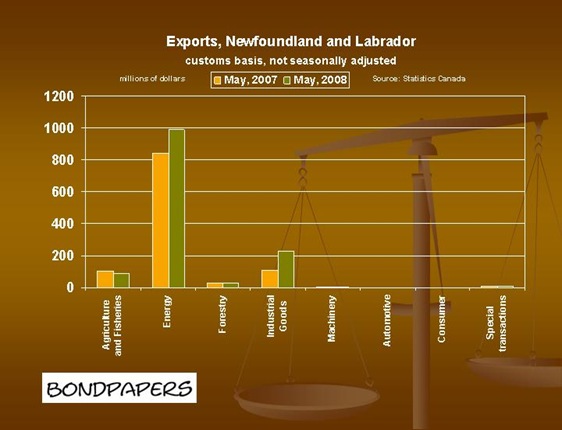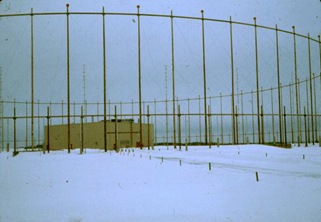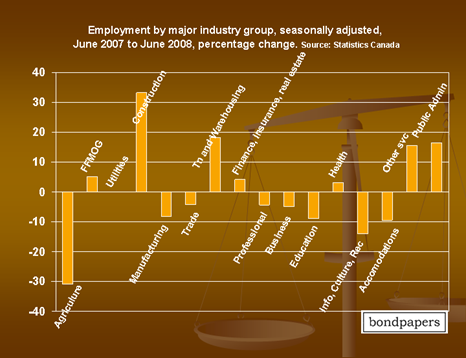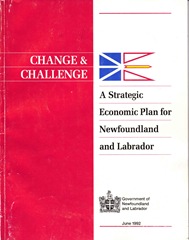
The Province's fisheries, forestry and mining industries cannot be expected to provide much, if any, net increase in employment during the years ahead. In fact, employment in these resource industries has been declining steadily over the last decade, as shown in Chart 5. In the forest industry, person years of employment declined from 5,300 in 1981 to 3,600 in 1991, and in the fishing industry employment declined from 21,700 to 19,200 during the same period. The decline in the mining industry was similar, falling from 5,600 in 1981 to 3,200 in 1991.
To provide the new jobs needed to reduce our high unemployment rate and to provide employment opportunities for our young people as they enter the labour market, new growth opportunities must be identified. While our economy is more diversified than is generally recognized, further diversification is no longer merely desirable - it is essential.
Advances in telecommunications, the globalization of trade, the environmental movement and the growth of knowledge-based industries have changed economic prospects internationally, nationally and locally, and Newfoundland and Labrador enjoys many potential competitive advantages which it can use to benefit from these changes. It has a strategic location dose to Europe which could allow it to act as a gateway to and from North America, a relatively unspoiled natural environment with magnificent scenery and untouched wilderness areas, and many well-educated and well-trained people, including a core of professional expertise in marine-related engineering and electronics.
The challenge is to recognize these new opportunities and for the private sector to take advantage of them, with Government's support. Traditionally we have thought of ourselves as producers of raw materials, but several companies in the Province have already become sophisticated traders of knowledge-based, value-added goods and services in local, national and international markets. It is through the creation of
new wealth in
new industries that the Province's problems of over-dependency and under-employment will ultimately be addressed.
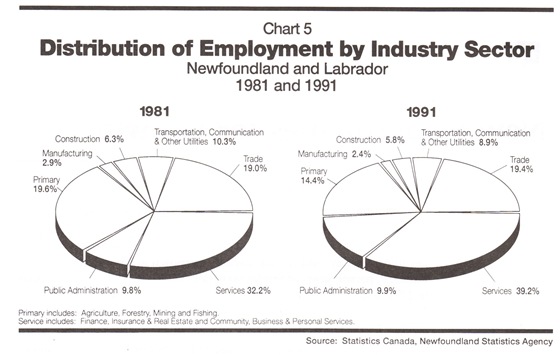
In its strategic economic plan, the Province has identified three main areas of growth. These are:
- manufacturing and technical industries
- tourism and culture
- energy.
Manufacturing and technical industries will build on existing engineering and technical strengths, especially in marine-related activities. Tourism and cultural industries will grow by taking greater advantage of the province's natural environment, our unique culture, our quality of life and our human skills. Energy industries will grow through developing our significant growth potential in oil and gas, hydroelectricity, alternative energies (such as peat, wood biomass and cogeneration) and by a demand for greater energy efficiency. These three established industry groups offer significant potential for new wealth generation and increased employment during the next decade, and government's economic development thrust will be targeted on these industries.
Manufacturing and Technical Industries
In this strategic economic plan, manufacturing and technical industries include
- non-resource-based manufacturing
- innovative technologies
- information industries
- professional services
- environmental industries.
Non-resource based manufacturing (in Newfoundland and Labrador, virtually all manufacturing other than fish processing and pulp and paper making) declined after Confederation in 1949 because the elimination of customs duties made it impossible for many local firms to compete with cheaper "imports" from mainland Canada. But, more recently, and very gradually, non-resource-based manufacturing has become more important, so that now there are about 400 such firms operating in the Province, accounting for 4.1% of our GDP in 1990. This makes it more significant than some of our traditional resource industries.
Although Newfoundland and Labrador manufacturers produce mainly for the provincial market, some firms, selling such products as paint, footwear and ice cream, compete successfully in mainland Canada. There is also a small, but growing number of innovative technology companies (those using proprietary intellectual property and advanced scientific or technical know-how to provide new goods or services) that export sophisticated, knowledge-based electronic and telecommunications products to the global marketplace. This industry developed rapidly during the 1980s, so that by 1990 there were 55 such firms and organizations employing an estimated 1,200 people and with total annual revenues approaching $100 million.
Information industries are the fastest growing part of the economy, both nationally and internationally. Because of the way national statistics are collected, it is difficult to specify the actual number of firms and people employed in this industry in the Province, but it is estimated that Canada's information technology industry grew by 5% in 1991 despite the current recession, and had revenues of more than $16 billion.
Although it is not possible to identify the Province's share of this industry, we do know that Newfoundland and Labrador already has considerable strengths in the application of telecommunications technology. Altogether, it is estimated that more than 100 private- and public-sector organizations are now active in the province's information industry and employ dose to 2,600 people. To achieve more rapid growth, these private firms need better access to provincial government markets which are now served mainly by Newfoundland and Labrador Computer Services. This Crown agency has recently been given a direction to cooperate and collaborate on efforts to promote the commercial development of this industry.
The services sector now accounts for nearly 30% of global trade, and Canadian trade and consulting services have seen exponential growth, rising from $42 million in revenues in 1969 to $987 million in 1985. Although the Province's business service industry now has some 250 professional consulting firms employing more than 3,000 people with expertise in such services as business consulting, construction management and economic analysis, the export of this expertise to bring new money into the province has been small to date. This industry is relatively undeveloped and has much potential for growth.
Environmental firms are also enjoying rapid growth internationally as jurisdictions everywhere become more concerned about, and introduce new legislation to protect, the environment. During the past 10 years, approximately 25 Newfoundland-based companies have developed expertise in such activities as environmental consulting, oil spill clean-up, waste management, recycling, environmental assessment and information, geomatics and environmental technology development. This is still a small industry in Newfoundland and Labrador, but it has significant potential for growth.
The Government will place greater emphasis on these manufacturing and technical industries in the future, and will work with private firms to help them realize their, growth potential in both local and export markets. New initiatives will be introduced to encourage supplier development so that local products and services can gain better access to large private and public organizations that operate in the province, including government itself; and new programs will be introduced to help local firms gain access to, or become more competitive in, export markets.
To achieve these goals, the Department of Development will be re-focused and re-organized for the new challenges of the 1990s. The Tourism Branch will be incorporated into a new Department of Tourism and Culture (described in the following section) and responsibility for the development of resource industries will rest more with their respective departments. A new Department of Industry, Trade and Technology will be given a mandate to encourage and promote the growth of manufacturing and technical industries and will be affirmed as the provincial agency with the main responsibility for trade and industrial promotions, for attracting investment and for technology development. It will also provide a centralized business analysis service for other departments.
The new department will focus specifically on stimulating the growth of non-resource-based manufacturing, innovative technologies, information industries, professional services and environmental industries. The department will also be responsible for strengthening the Province's construction industry, which is a major employer, contributes significantly to GDP and affects the competitiveness of other sectors. It will also undertake initiatives to make Newfoundland and Labrador firms more competitive, both at home and abroad. These initiatives will include supplier development, technology transfer, trade development, business analysis, business policy, promotions and investment. The department will also take a targeted, proactive approach to attract outside firms to the province.
Consistent with a major theme of this strategic economic plan, the Department of Industry, Trade and Technology will focus attention on our marine environment. Special initiatives will be undertaken to assist marine-related industries, with particular emphasis on the development and commercialization of advanced marine technologies.
Strategy Statement. The Province mill stimulate growth in sectors of the economy where there are new opportunities, especially in non-resource-based manufacturing, innovative technologies, information industries, professional consulting services and environmental industries.
Actions. The Province will
51. Re-focus and re-organize the Department of Development into a new Department of Industry, Trade and Technology which will concentrate on stimulating the growth of the manufacturing and technical industries in local and export markets, improving the competitiveness of local firms, and actively targeting outside firms in the new growth industries to locate in the Province.
52. Establish a supplier development program which will provide the private sector with the knowledge and opportunity to capture a more significant portion of the public- and private-sector procurement markets, such as major capital projects and defense contracts.
The Province will organize supplier seminars and make supplier development a major part of the provincial industrial benefits policy.
53. Pay specific attention to the information technology industry; a standing-offer list of approved suppliers of products and services will be developed for use by all government departments and agencies.
54. Expand financial assistance programs to firms involved in manufacturing and technical industries. Assistance will be provided for research and development, commercialization of new technology, company development, export marketing and working capital financing.
55. Create within the Department of Industry, Trade and Technology the funding flexibility needed to attract public- and private-sector research organizations to establish in the Province.
56. Aggressively pursue multinational manufacturing and technical firms to locate here, particularly those firms which would fit established niches in marine industries and electronics applications.
57. Continue to work for the establishment of foreign trade zones as an economic development initiative.
58. Establish a Provincial Communications Agency, which will include representation from the public, private and educational sectors, for expanding data communications, for co-ordinating data networking initiatives within the Province, and for developing common standards for the industry. The Communications Division (currently located in the Department of Municipal and Provincial Affairs) will be transferred to the Department of Industry, Trade and Technology so that it can assume a leading role in this area.
59. Encourage the development of an education-related information industry to create products for the Province's education system and for export; develop enhanced instructional capacity in software design and development in our community colleges and university.
60. Support the private sector through the development and implementation of a program aimed at exporting the Province's business and professional consulting services. This program will match local companies with foreign contracts administered by such agencies as CIDA and the World Bank.
Tourism and Culture
The Province's unique history, environment, culture and lifestyle offer some of the greatest opportunities for economic growth in the 1990s and beyond. The combination of its scenic beauty, its long and colourful history, its pristine areas, its rich culture and the renowned talents of its people constitute a resource that is still underdeveloped and underestimated. These resources are not only renewable, but can continue to be expanded and enhanced.
Tourism and culture can also employ, both full time and part time, more people than any other resource or industry. Crafts production, for example, although a long-standing and growing contributor to the provincial economy, can become more business-like and professional and find new opportunities for growth. While our crafts have been successful in this province and in other parts of Canada, there are also significant opportunities in the international marketplace.
As business and daily living become more complex and globally competitive, alternative lifestyle and cultural values will increase in importance when businesses decide where to locate, to meet and to hold conventions, and when people plan vacations. With proper development and promotion of our traditional, indigenous qualities and advantages -especially our unique marine environment - Newfoundland and Labrador can create a niche as a major holiday destination and cultural region in North America.
All the necessary natural and human resource components to achieve these objectives have existed for a long time. What has been lacking is a concerted, co-ordinated strategic program to blend them into one major economic entity.
In the tourism and cultural industries of the future, our relative remoteness from highly industrialized areas, our sparse population in a large landmass, and our relaxed pace of life will be seen as major advantages.
We have much to offer, including
- the oldest and richest history in Canada, with two world heritage sites;
- a marine environment which offers opportunities for cruises, yachting, whale-watching, seabird sanctuaries, wind-surfing, sea-kayaking, ocean sports fishing and other marine-related activities;
- outstanding scenery and ecological diversity;
- world-class hunting and recreational fishing;
- excellent multi-season recreational facilities;
- the wilderness experience at affordable rates;
- a vibrant cultural community, with a rich folklore preserved through five centuries of continuous settlement;
- artists, musicians, actors, writers, sculptors, dancers, and craft artisans - both professional and amateur - in numbers that are disproportionate to our population, and many of whom have achieved national and international stature; and
- a quiet, peaceful, civilized life-style and a reputation for hospitality.
It has been proven in the past that Newfoundland and Labrador is a desirable destination for business and personal travel. We have to build on this reputation by improving facilities and services, and by developing the potential of adventure tourism, events-related visits, conventions, conferences, seminars and executive retreats, and emphasising the attractions for students, writers and researchers, naturalists, artists, artisans, performers and others engaged in both professional and amateur cultural activities.
The achievement of this objective will require a concerted, aggressive effort by both Government and the private sector. Tourism and culture are complex industries, involving the mandates of various government departments both provincially and federally, and further development will require active partnerships between industry associations and individuals, government agencies and departments, communities and municipalities.
At the present time, the essential components of a vibrant tourism and culture industry are spread through the departments of Development, Municipal and Provincial Affairs, Environment and Lands, and Enterprise Newfoundland and Labrador. Consolidation and co-ordination of government activities is necessary.
Strategy Statement. The Province mil implement programs to ensure that Newfoundland and Labrador is developed into an internationally known destination of choice in the vacation and business travel industry by promoting our natural advantages, expanding and improving facilities and services, and enhancing and promoting our cultural resources.
Actions. The Province will
61. Establish a new Department of Tourism and Culture. This new department will include the Tourism Branch of the Department of Development, the Cultural Affairs and Historic Resources divisions of the Department of Municipal and Provincial Affairs, the Parks and Wildlife divisions of the Department of Environment and Lands, and the Crafts Industry activities of Enterprise Newfoundland and Labrador.
62. Through the new Department, immediately initiate a consultation process with representatives of the tourism, cultural, environmental, and recreational sectors to develop and implement a comprehensive Tourism and Culture Economic Strategy. This joint task force would build on the extensive research and consultation of the Economic Recovery Commission, the O'Flaherty Report and other sources as required.
63. Give priority to the development of special year-round events of national and international interest within the Province, such as unique festivals, cultural activities, tournaments, historical observances and celebrations.
64. Assist the John Cabot (1997) 500th Anniversary Corporation to maximize the economic benefits to be realized from the international activities associated with the 500th Anniversary of John Cabot's landfall.
65. Initiate private-sector and other partnerships to develop further primary destination areas, especially those which offer multi-season potential.
66. Give priority to the development of winter recreation attractions, particularly further development of the Marble Mountain area as a major skiing destination area; and the development of cross country skiing, snowmobiling and dog-sledding events.
67. Expand the national and international conventions and meetings trade through promotional contact with societies, organizations and corporations, and encourage the development of facilities and services for business meetings and executive retreats; where possible, meetings and conventions should be coordinated with special events and observances. The success of these efforts will likely create a demand for additional facilities to be provided by the private sector.
68. Recognize the western region of Newfoundland and Labrador as a specific cultural destination to maximize the economic benefits from its unique attractions, such as the two UNESCO World Heritage Sites (L'Anse aux Meadows and Gros Morne) located within a few hours' drive from each other, the 4,000-year-old Maritime Archaic Indian burial ground at Port au Choix, the Basque whaling station at Red Bay, the historic Grenfell Mission headquarters in St. Anthony, the Stephenville Festival of the Arts, French heritage festivals in the St. George's-Port au Port region, and other events and attractions of cultural importance.
69. Further develop the fine arts school at Sir Wilfred Grenfell College in Corner Brook as an Atlantic Fine Arts Centre of Learning, for the development of drama, music, folklore, visual arts, writing and associated disciplines.
70. Seek a Cooperation Agreement in Cultural Industries with the Federal Government.
71. Transfer administration and control of Arts and Culture Centres to appropriate regional or community organizations.
72. Implement programs to facilitate the development of adventure tourism. Research and other initiatives will be undertaken in the areas of marketing, training and upgrading standards of quality and performance. Legislation, regulations and policies will be reviewed to remove constraints which restrict further development of this activity.
73. Give priority to the revitalization of recreational fishing on the salmon rivers of the Province - an activity which can become one of the major contributors to the tourism industry if developed fully. Management of these rivers will ensure that maximum economic benefits accrue to the adjacent communities. The new Department of Tourism and Culture will play a leading role in the development of all recreational fisheries.
74. Eliminate unnecessary and unfair regulations which limit opportunities to develop and promote attractions and services; and improve regulations which enhance the quality of tourism and those which protect the public, the environment and the wilderness resource.
75. Participate in industry's implementation of an accommodations grading system and a human resource development program focused on improving the quality of our hospitality services. Emphasis will be placed on training, enforcing occupational standards and certification through licensing and assistance programs.
76. Ensure that funding assistance for new tourism activity will not be detrimental to present operations.
77. Extend the operating season of selected provincial parks and historic sites in response to tourist demand, and request the Federal Government to take similar action for facilities falling within their jurisdiction.
78. Seek Federal Government participation in the establishment of a National Wilderness Park in Labrador.
79. Pursue improvements in the quality of the Gulf ferry service operated for the Federal Government by Marine Atlantic and seek a reduction in fares.
80. Implement a new highway signs policy to address current industry concerns and provide dear direction and information for travelers.
81. Increase production and enhance the quality of crafts through expanded community college programs and additional field instruction.
82. Through adequate research and development of products, effective promotion, provision of operating capital for producers, and the establishment of marketing agencies (retail and wholesale) within and outside the province, ensure that craft production and marketing are integral components of the tourism and culture industry.
Energy
Energy represents a large and growing component of the provincial economy. It is a critical part of virtually every production process, and its price, availability and reliability are of the utmost importance to economic progress. Factors affecting energy thus influence our productivity and competitiveness, especially the heavy industrial users of electricity. Its price and availability also affect the standard of living of the Province's citizens.
Total energy demand in 1990 was equivalent to about 20 million barrels of oil. Increases in the residential and transportation sectors were offset by a substantial decrease in the industrial sector, attributable to a decrease in mining and manufacturing activity. Overall, refined petroleum products accounted for 65% of energy consumption, electricity 27% and wood fuel 8%. Transportation is the largest energy-consuming group (42%), followed by industries (29%), residential use (20%) and commercial establishments (9%). It is estimated that the direct contribution of the energy industry to the Province's Gross Domestic Product (GDP) in 1990 was in the order of $571 million, or 7%.
Strategy Statement. Government mil work to ensure that efficient energy resource management is used to strengthen the contribution of energy to overall economic development objectives.
Action. The Province will
83. Undertake a thorough review of existing energy policy to ensure that it is consistent with changing local, national and international economic conditions. An important aspect of this work will be to consolidate the many components into a comprehensive and integrated energy policy document.
Electricity Generation
Under current demand forecasts, there will be a need for an additional supply of electricity to the island portion of the province as early as 1996. Given the anticipated demand estimates and the lead times necessary to bring a new supply on line, Newfoundland and Labrador Hydro recently called for proposals for the supply of 50 MW of capacity from small hydro sites for that time frame. Decisions about these additional sources will have to be made within a year or two.
One option for meeting the shortfall beyond the year 2000 is the development of the Lower Churchill River hydro sites, including a transmission link from Labrador to the Island. The National Energy Board shows the Lower Churchill River development as ranking number one in economic priority among 45 identified energy projects in North America. This option would provide an assured long-term supply of electricity to the Island for the 21st century and would accommodate any feasible industrial activity in Labrador but is dependent on an agreement between Newfoundland and Labrador Hydro and Hydro Quebec.
Because of uncertainty associated with the Lower Churchill development, it is necessary to consider a strategy to meet the anticipated supply shortfall in case that development is delayed or does not proceed. In either case, to meet its requirements the Province would have to rely more extensively on other alternatives, such as other hydro developments, alternative energy developments and/or expansion of the existing Holyrood oil-fired plant. In addition, the Province will have to pursue improvements in energy efficiency and cogeneration, primarily as a means to improve the competitiveness of local industry.
Strategy Statement. The Province's objective is to ensure the development, generation and distribution of electricity in the most economical and efficient manner, to ensure that the balance of supply and demand is maintained and to maximize economic benefits to the Province from energy projects.
Actions. The Province will
84. Continue to pursue development of the Lower Churchill River so as to maximize economic benefits to the Province and provide residents with a long-term supply of electricity at a stable price.
85. Through the Department of Mines and Energy and Newfoundland and Labrador Hydro, prepare a plan for energy efficiency and the development of various energy sources to ensure the future balance of energy supply and demand for the Province.
86. Amend the
Electric Power Control Act to broaden the mandate of the Public Utilities Board, including giving the PUB the authority to review agreements such as that envisaged for the Lower Churchill River Development.
87. Put in place policies to maximize electricity generated from small hydro developments as a means of increasing economic development and reducing dependence on imported oil.
Petroleum
The current policy of the Province with respect to onshore and offshore petroleum resources is to encourage and promote development in a manner which maximizes economic benefits to the Province. Presently, however, prospects for offshore oil and gas are uncertain because of such factors as the withdrawal of Gulf Canada from the Hibernia development, low prices resulting in low cash flow to industry, and competing projects elsewhere in the world.
For Hibernia, the best scenario is that the remaining owners will find a new partner and that the project will be finished with a production start in 1997. The worst is that the current difficulties experienced with Hibernia will not be overcome. In other offshore projects, the Province should see the start of development on at least one and possibly other fields, such as Terra Nova, Whiterose and Hebron, by the year 2000 or shortly thereafter.
Though the present level of exploration is low, the geological potential of the Grand Banks area is significant and future drilling is expected to find additional commercial-size fields. The offshore and onshore areas of the Province's west coast also offer some promise, as evidenced by the interest in land sales and seismic surveys in the past two years.
Strategy Statement. The Province will encourage both onshore and offshore exploration and development opportunities through all measures available to it, including the continuing development of a regulatory framework sensitive to changing economic conditions and global competition for investment.
Actions. The Province will
88. Develop and implement competitive generic royalty regimes for both onshore and offshore petroleum production.
89. Work with the Federal Government towards identifying and eliminating constraints in the current land tenure system for the offshore area.
90. Actively monitor and provide advice and direction, as required, to the Canada-Newfoundland Offshore Petroleum Board to maximize the use of goods and services provided from within the Province.
91. Insist on having appropriate input into employment and industrial benefits plans as a prerequisite to the start of individual oil exploration programs and new oilfield developments.
92. Aggressively pursue supplier development initiatives and ensure that full and fair opportunity to bid is provided for contracts related to petroleum exploration, development and production.
93. Develop a program to ensure that onshore and offshore petroleum resources are promoted in an effective manner.
94. Ensure that the employment and industrial benefits from the Hibernia project production phase are maximized.
Energy Efficiency and Alternative Energy
Energy efficiency and alternative energy can play an important role in the state of the Province's energy supply in the 1990s. The Department of Mines and Energy, in consultation with representatives from the private sector, has prepared a ten-year Strategic Plan for Energy Efficiency and Alternative Energy. This plan will improve the efficiency of energy use in Newfoundland and Labrador through new technologies and better operating practices for vehicles, equipment and buildings. The plan also encourages the development of local alternative energy resources, such as waste wood, peat and small hydro developments.
Strategy Statement. The Province will develop its alternative energy resources and promote energy efficiency as a means of contributing to its overall energy requirements, to lessen its reliance on imported petroleum products and to create new business opportunities.
Actions. The Province will
95. Implement the recommendations of the Strategic Plan for Energy Efficiency and Alternative Energy. Some of the key actions of this plan are
- to establish a diverse program of measures, ranging from information dissemination to legislative changes, to reduce costs through energy efficiency improvements and the use of alternative energy sources, with the aim of improving the competitiveness of local business and industry;
- to continue to promote, through support for energy research and development, alternative energy technologies and engineering studies, and economic development of the province's vast peat resources; and
- amend regulations to facilitate the development of hydroelectric and other potential energy sources by independent power producers.
-srbp-
Change and Challenge: Chapter Six - Enhancing our resource industries
